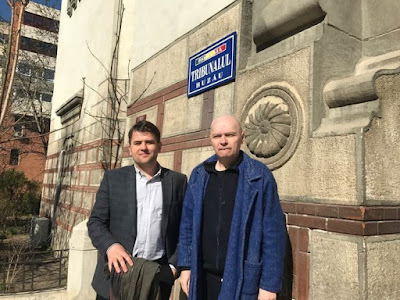This is a short note that I wrote for the European Implementation Network website, where it was published originally.
On 29 January 2001, Alexandru Nabosnyi was arrested and committed to a psychiatric hospital, based on a short news story in a local newspaper, accusing him of various sexual crimes. A psychiatric report subsequently stated he lacked discernment due to being diagnosed with schizophrenia and a court formally validated the psychiatric detention order. The criminal investigation, which was protracted and superficial, resulted in most charges against him being dropped. Regardless, Mr. Nabosnyi went on to spend his next seventeen years involuntarily detained in high security psychiatric hospitals.
Mr. Nabosnyi went before courts regularly, asking to be released, but the default position was that he was too ill and too dangerous to be released, despite the charges against him having been dropped. The European Court of Human Rights took a different view. By a judgment delivered on 28 February 2018 in the case N. v. Romania, the Court decided that Mr. Nabosnyi had been unlawfully detained since at least 2007. The national authorities had failed to adduce any evidence to prove that he was dangerous. His release was delayed by the absence of suitable facilities helping patients re-settle after long periods of detention. The proceedings reviewing the validity of Mr. Nabosnyi’s detention were flawed due to poor ex officio legal assistance and widespread procedural irregularities. In line with Mr. Nabosnyi’s request, the Court made use of its powers under Article 46 and instructed the Romanian Government to immediately release him in conditions meeting his needs and to take general measures ensuring that psychiatric detention was lawful, justified and not arbitrary.
From the outset, two obstacles hampered the implementation process. First, after having spent seventeen years in psychiatric detention, Mr. Nabosnyi lacked a network of support in the community, besides not owning any property. Far from being a mere formality, his release and transition to living in the community required substantial preparation and assistance. Second, at the beginning of 2018, after separate proceedings occasioned by his initial complaint to Strasbourg, a local court placed him under plenary guardianship and named a local village mayor to act as guardian. This decision had complex ramifications to do with being able to take decisions related to living in the community or enjoying the just satisfaction awarded by the Court.
On 2 May 2018, I filed a Rule 9§1 submission on Mr. Nabosnyi’s behalf, informing the Committee of Ministers about the bureaucratic inertia hindering his release to a suitable community-based arrangement and about his placement under guardianship. Following the submission, on 29 May 2018, Mr. Nabosnyi was finally released from the psychiatric hospital and transferred to a social care home in Bucharest, his hometown. Although that is also a closed institution, it is a superior arrangement that provides a sense of progress after seventeen years of psychiatric detention. On 20 August 2018, I made the second Rule 9§1 submission, attempting to dispel the Government’s argument to the effect that the social care home constituted a satisfactory solution, rather than, as I argued, a mere stepping-stone to a community-based arrangement, corresponding with the Court’s Article 46 request.
Beyond individual implications, Mr. Nabosnyi’s case shines a light on Romania’s forensic detention system, which warehouses psychiatric patients in very poor conditions, often indefinitely, without meaningful judicial scrutiny. A European Implementation Network workshop in May 2018 helped me prepare the forthcoming exchanges with the Romanian Government before the Committee of Ministers regarding general measures. On 29 October 2018, the Government submitted a poor action plan, devoid of meaningful substance. On 21 November 2018, I submitted a detailed Rule 9§2 briefing on behalf of three disability rights non-governmental organizations, providing the Committee of Ministers with information regarding the general state of the forensic detention system in Romania and outlining the general measures required with a view to achieving reform and ensuring access to justice for patients.
In December 2018, the Committee of Ministers issued a very positive decision, in line with our expectations. On general measures, the CM asked the Government to submit a revised action plan. On individual measures, the CM accepted that the social care home was but a temporary arrangement and called on the Government to ensure Mr. Nabosnyi’s move to community living as soon as practicable. In addition, the CM strongly criticized the guardianship system in place in Romania, which deprived Mr. Nabosnyi of “the exercise of his civil and political rights,” called for immediate reform and asked the Government to ensure his interests were safeguarded in the interim period.
The Committee of Ministers process constituted a catalyst for increased advocacy at the domestic level to reform the forensic detention system. New alliances were formed, that engaged in dialogue with the Government. Other procedures were leveraged for pressure, including by securing positive references in the Commissioner for Human Rights’ report on her visit to Romania in November 2018. On individual measures, the authorities are working towards securing Mr. Nabosnyi’s transfer to the first state-run sheltered housing facilities in Bucharest, that are due to be opened this year.

No comments:
Post a Comment